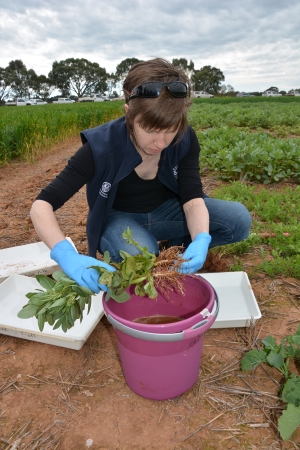Increase pulse inoculant in dry conditions this seeding
Increase pulse inoculant in dry conditions this seeding
Author: GRDC Adelaide office | Date: 12 Mar 2020

Growers planning to dry sow pulses on soils responsive to inoculation this season are encouraged to double the rate of peat inoculant or use a granular inoculant which delivers a high number of rhizobia at sowing to increase the likelihood of successful nodulation and nitrogen fixation.
This approach can allow growers in drier climates more flexibility when sowing pulses in suboptimal conditions.
Liz Farquharson, senior research officer with Primary Industries and Regions South Australia’s research division, the SA Research and Development Institute (SARDI), says pulse grain prices and nitrogen fixation benefits make pulses an attractive crop option.
However, dry sowing can hinder the survival of the applied rhizobia bacteria as they are sensitive to desiccation. The longer the ‘dry period’ between sowing and germinating rains, the higher the risk of an inoculation failure.
“Dry sowing is less of a concern where a legume nodulated by the same rhizobia group has been grown recently in the paddock and the soil is favourable to rhizobia survival,” Dr Farquharson says. “In these conditions, the risk of nodulation failure is much lower.”
Research to optimise legume inoculation for dry sowing was recently funded by the SA Grain Industry Trust (SAGIT) and is currently included in the Grains Research and Development Corporation (GRDC) investment, ‘Increasing nitrogen fixation in pulse crops through the development of improved rhizobial strains, inoculation and crop management practices’, led by SARDI senior scientist Ross Ballard.
Inoculants that carry the ‘Green Tick’ logo (approved by the Australian Inoculants Research Group) meet minimum quality standards (purity and number of rhizobia per gram of product). This rating will soon be available for granules.
Dry sowing is discouraged on hostile soils, especially acid soils (pHca<6.0) for bean, lentil and pea. Dr Farquharson also advises growers to take particular care if they intend to inoculate seed which has been treated with pesticides.
“Where pesticide application is necessary, the rhizobia are best applied to seed as close to sowing as is possible and sown into moist soil, or granular inoculant may provide a better option as this reduces direct exposure of the rhizobia to the pesticide,” she says.
The project will also develop enhanced inoculation and crop management practices to maximise nitrogen fixation in suboptimal conditions and avoid any impact of crop protection chemicals and fertiliser on nodulation. This includes the development and release of improved rhizobia for bean and lentil on acid soils.
It is hoped the new rhizobia strain will have a substantial impact in the southern cropping region where pulse production is expanding into high rainfall areas with characteristically low pH soils.
Contact Details
For Interviews
Bridget Penna, AgCommunicators
0429 676 413
Contact
GRDC Adelaide office
(08) 8198 8400
media@grdc.com.au
GRDC Project Code: 9176601,
